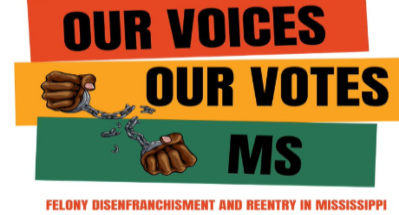Photos: ACLU\Twitter
JACKSON, Miss. – The Southern Poverty Law Center (SPLC) and Simpson Thacher & Bartlett LLP filed an amicus brief yesterday supporting the plaintiffs in Harness v. Watson who are seeking – like plaintiffs in ongoing SPLC-filed litigation Hopkins v. Hosemann – to dismantle Mississippi’s lifetime voting ban for certain felony convictions, including writing bad checks and timber larceny.
The Harness plaintiffs will participate in upcoming en banc oral arguments in September in the U.S. Court of Appeals for the Fifth Circuit re-assessing an earlier panel decision there. As yesterday’s amicus brief points out, the Hopkins case brings claims before the Court not in the Harness case. The Hopkins litigation not only asks that the state’s disenfranchisement scheme be struck down on separate constitutional grounds, it also challenges the state’s arbitrary and standardless “suffrage bill” re-enfranchisement scheme in which Mississippi’s Legislature has the power to restore voting rights on a case-by-case basis.
The Harness and Hopkins cases were filed in 2017 and 2018, respectively, and consolidated in the United States District Court for the Southern District of Mississippi. But the appeals of the two cases were heard by separate panels at the Fifth Circuit. The Hopkins plaintiffs await the decision of their initial Fifth Circuit panel, which heard oral arguments in New Orleans in December 2019.
The amicus brief is available in full here.
The following statement is by Jonathan K. Youngwood, Co-Chair of the Litigation Department at Simpson Thacher & Bartlett:
“The right to vote is a cornerstone of our democracy. Mississippi’s unconstitutional criminal disenfranchisement law continues to affect tens of thousands of Mississippians who have completed their sentences and who should be able to participate fully as citizens in their local government.”
The following statement is by Caren Short, senior supervising attorney for the SPLC:
“In yesterday’s brief, we demonstrated clearly to the Court how Mississippi’s scheme of felony disenfranchisement and re-enfranchisement was originally intended to maintain white supremacy in the state. Over 130 years later, it still is carrying out its original intent and disproportionately locking Black Mississippians out of the political process for life. Only two Mississippians with felony convictions were able to obtain the support of a legislator this year to bring an individual suffrage bill in their name and obtain the needed two-thirds support of both chambers of the Mississippi Legislature.
“We look forward to the arguments the Harness plaintiffs will make and optimistically await a decision in the Hopkins appeal. Our clients – including Dennis Hopkins, who has fought for years for the fundamental right to have a voice in the democratic process – hope that they will one day be able to cast a ballot like their fellow Mississippi citizens.”
For more information, visit www.splcenter.org.
(www.simpsonthacher.com)







